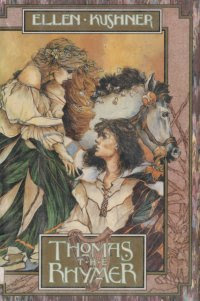 Thomas the Rhymer
Thomas the Rhymerby Ellen Kushner
Tied for 1991 World Fantasy Award Winner for Best Novel
You might get the impression reading through some of these reviews that I hate medieval settings. That isn't true: I hate pseudo-medieval settings, the ones where they mash in everything from a range of 700AD to 1600AD, populate it with twentieth century characters, and everything has to hold together by authorial fiat. Thomas the Rhymer is a good example of using a medieval setting well and it doesn't hurt that there's a very good story to it as well.
The novel Thomas the Rhymer is the story of Thomas the Rhymer shifted to a modern style rather than thirteenth century poetry. Thomas is a wandering bard and good natured rogue. On one his journeys he befriends a childless peasant couple and he returns to them time and time again between harping at various courts and running from cuckolded husbands. He falls in love with a girl there and is considering settling down when he encounters the Queen of Elfland. She entrances him and he spends seven unaging years with them before returning where he finds that he can only speak the truth.
It's a story of archetypes and broad strokes. Even if you're not really familiar with the story of True Thomas or the novel you can easily guess where it goes. What matters in Thomas the Rhymer is that the old story is told very well.
Take the characters, for example. Kushner gives each of the major human characters a lengthy section of the novel from their viewpoint. That's four very distinct voices that a reader could never mistake for each other in the book. And even though I could boil them down to one or two word descriptions these characters are not completely bound by their archetypes. Thomas, for example, has to grow into his role as he spends time in Elfland but even before that he's given edges and dimensions that prevent him from being another generic fun loving rogue.
You could even argue that character change and growth is a theme of the novel with the human characters placed against the timeless fairies who can never be any different. Humanity learns, adapts and deals with the consequences of their actions while fairies laugh and play and never do more. Using those contrasts is part of what sets Thomas the Rhymer apart from weaker novels.
If you happen to write a novel about a bard then you need to write well and Kushner does not disappoint here. She avoids the trap of overwriting and florid prose that tends to accompany such characters and just does things well. It helps that she spreads her viewpoint out and doesn't even use Thomas until the second section of the book (his lengthy trip to Fairie). I hate to use the term lyrical to describe the prose since it tends to get used in conjunction with people who thought they were writing poetry rather than a novel but really there is no other word for the qualities of this book.
Because I loved the characters and writing in Thomas the Rhymer the fact that it was an old story didn't matter. If the characters in a book are engrossing then placing them in a situation where the reader can just watch them react can be sufficient. This is a very good novel based solely on how well written it is and I strongly recommend it to anyone who doesn't need sword fights in their medieval fantasy.
